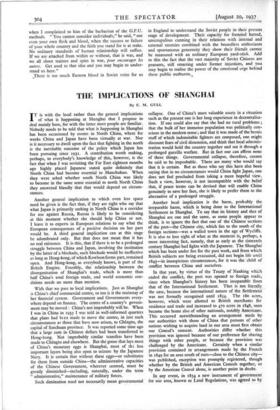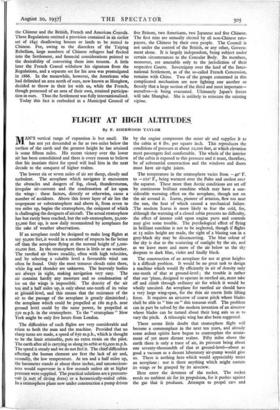THE IMPLICATIONS OF SHANGHAI
By E. M. GULL
IT is with the local rather than the general implications of what is happening at Shanghai that I propose to deal mainly here, for with the latter most people are familiar. Nobody needs to be told that what is happening in Shanghai has been occasioned by events in North China, where for weeks China and Japan have been virtually at war. Nor is it necessary to dwell upon the fact that fighting in the north is the inevitable outcome of the policy which Japan has been pursuing since 1931. A contribution worth making, perhaps, to everybody's knowledge of this, however, is the fact that when I was revisiting the Far East eighteen months ago highly placed Japanese stated quite definitely that North China had become essential to Manchukuo. When they were asked whether south North China was likely to become in the same sense essential to north North China they answered blandly that that would depend on circum- stances.
Another general implication to which even less space need be given is the fact that, if they are right who say that what Japan is primarily seeking in North China is a corridor for use against Russia, Russia is likely to be considering at this moment whether she should help China or not. I leave it to experts in European relations to say what the European consequences of a positive decision on her part would be. A third general implication can at this stage be adumbrated only. But that does not mean that it has no real existence. It is this, that if there is to be a prolonged struggle between China and Japan, involving the institution by the latter of a blockade, such blockade would be ineffective as long as Hong-kong, of which Kowloon forms part, remained open. And Hong-kong, as everybody knows, is part of the British Empire. Fourthly, the relationship between the disorganisation of Shanghai's trade, which is more than half China's total foreign trade, and world economic con- ditions needs no more than mention.
With that we pass to local implications. Just as Shanghai is China's chief commercial centre, so too is it the mainstay of her financial system. Government and Governments every- where depend on finance. The centre of a country's govern- ment may be moved : China's not improbably will be. When I was in China in 1935 I was told in well-informed quarters that plans had N en made to move the centre, in just such circumstances as those that have now arisen, to Chengtu, the capital of Szechuan province. It was reported some time ago that a large sum in Chinese dollars had been transferred to Hong-kong. Not improbably similar transfers have been made to Chengtu and elsewhere. But the goose that lays most of China's monetary eggs is Shanghai, most of th: less important layers being also open to seizure by the Japanese Navy. It is certain that without these eggs—or substitutes for them from outside China—the administrative capacities of the Chinese Government, wherever centred, must be greatly diminished—including, naturally, under the term " administrative," maintenance of military forces.
Such diminution need not necessarily mean governmental collapse. One of China's most valuable assets in a situation such as the present one is her long experience in decentralisa- tion. If one could also say that she had no rural problems ; that the bulk of her immense population was politically con- scious in the modem sense ; and that it was made of the heroic stuff of which indomitable fighters are composed, one might discount fears of civil dissension, and think that local adminis- tration would hold the country together and see it through a prolonged guerilla warfare. But in fact one can affirm none of these things. Governmental collapse, therefore, cannot be said to be improbable. There are many who would say that it is certain. But as those who say this have also been saying that in no circumstances would China fight Japan, one does not feel precluded from taking a more hopeful view. Such a view, however, is not incompatible with the belief that, if peace terms can be devised that will enable China genuinely to save her face, she is likely to prefer them to the alternative of a prolonged struggle.
Another local implication is the harm, probably the irreparable harm, which is being done to the International Settlement in Shanghai. To say that its history and that of Shanghai are one and the same, as some people appear to think, is to ignore the fact that one of the Chinese sections of the port—the Chinese city, which lies to the south of the foreign sections—was a walled town in the age of Wycliffe. It is also to lose sight of what at the moment is, perhaps, a more interesting fact, namely, that as early as the sixteenth century Shanghai had fights with the Japanese. The Shanghai which has been under fire for the past week, and from which British subjects are being evacuated, did not begin life until 1843—in inauspicious circumstances, for it was the child of conflict between China and ourselves.
In that year, by virtue of the Treaty of Nanking which ended the conflict, the port was opened to foreign trade, since when Shanghai's history has been inseparable from that of the International Settlement. That is not literally the case, because the international nature of the Settlement was not formally recognised until 1854. The 18o acres, however, which were allotted to British merchants for residence and trade and increased to 47o acres in 1848, soon became the home also of other nationals, notably Americans. This occurred notwithstanding an arrangement made by our authorities with those of China that persons of other nations wishing to acquire land in our area must first obtain our Consul's consent. Authorities differ whether this provision was ignored because of our preference for sharing things with other people, or because the provision was challenged by the Americans. Certainly when a similar provision contained in arrangements made by the French in 1849 for an area south of ours—close to the Chinese city— was published, exception was promptly registered, though whether by the British and American Consuls together, or by the American Consul alone, is another point in doubt.
In any event, in 1854 a new instrument of government for our area, known as Land Regulations, was agreed to by the Chinese and the British, French and American Consuls. These Regulations omitted a provision contained in an earlier set of 1845 disallowing houses or lands to be rented to Chinese. For, owing to the disorders of the Taiping Rebellion, large numbers of Chinese refugees had flocked into the Settlement, and financial considerations pointed to the desirability of converting them into tenants. A little later the French Consul withdrew his signature from the Regulations, and a separate set for his area was promulgated in 1866. In the meanwhile, however, the Americans who had delimited an area north of ours, now known as Hongkew, decided to throw in their lot with us, while the French, though possessed of an area of their own, retained participa- tion in ours. Thus the Settlement was fully internationalised.
Today this fact is embodied in a Municipal Council of five Britons, two Americans, two Japanese and five Chinese. The first nine are annually elected by all non-Chinese rate- payers, the Chinese by their own people. The Council is not under the control of the British, or any other, Govern- ment alone. It is largely independent, being subject under certain circumstances to the Consular Body. Its members, moreover, are amenable only to the jurisdiction of their respective Courts. Sovereignty over the land of the Inter- national Settlement, as of the so-called French Concession, remains with China. Two of the groups concerned in this complicated mechanism are now fighting one another so fiercely that a large section of the third and most important- ourselves—is being evacuated. Ultimately Japan's forces will take Shanghai. She is unlikely to reinstate the existing regime.







































 Previous page
Previous page